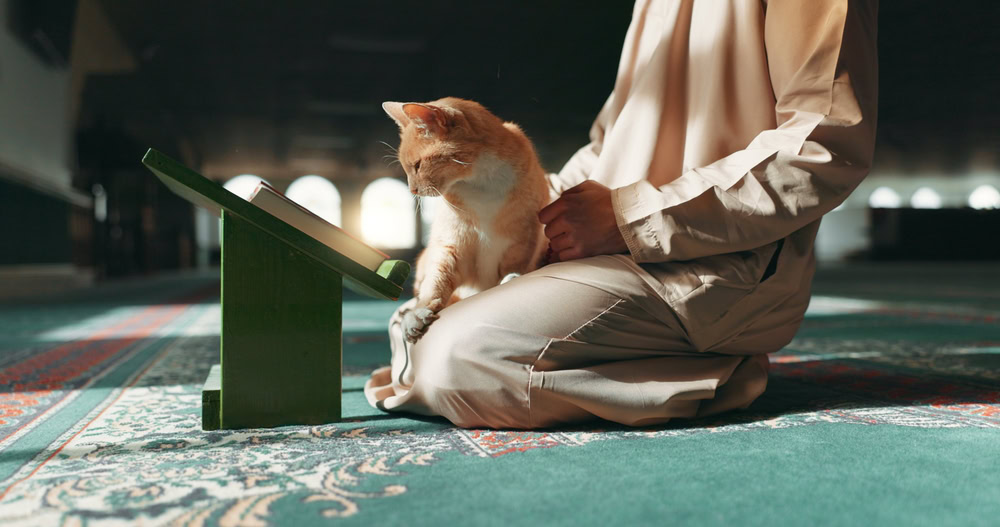Is My Prayer Valid if My Cat Licks Me? – Shaykh Irshaad Sedick
Hanafi FiqhShafi'i Fiqh
Answered by Shaykh Irshaad Sedick
Question
My cat, during tahajudd/Fajr, will often try to cosy up with me while I’m praying. For example, he will try to jump on me, playfully bite (no blood/cut) my toes, touch my face with his paws, and lick me. Is the licking a problem for the validity of my prayer? Of course, the cat is a distraction, but I try to ignore it or move it around without significant movement so I’m not breaking the prayer. Is that ok?
Answer
In the Name of Allah, the Most Merciful and Compassionate. May Allah alleviate our difficulties and guide us to what pleases Him. Amin.
In the Shafi‘i School, all living creatures’ saliva, moistness and perspiration are pure (except dogs and pigs). Your cat licking you does not affect the validity of your prayer. If you need to gently move your cat away, make sure not to make three large and consecutive movements, and your prayer will remain valid, and Allah knows best. [Nawawi, Al-Majmu‘ Sharh al-Muhadhdhab]
If your cat distracts you during prayer, you may want to consider closing the door to avoid the distraction until you are confident that your focus has strengthened.
Saliva and Perspiration of Living Creatures
Imam Nawawi (Allah have mercy on him) said: “When jurists discuss the leftover (thu’r) of the animals, they mean what is left after the animals eat or drink. And when they say the leftovers of the animals are pure or impure, they mean their saliva and the moistness of their mouths.
According to our opinion (Shafi‘i) the leftovers of a cat are pure without any reprehensibility, such as the leftovers of other animals like horses, mules, donkeys, beasts of prey and all other animals, whether they are permissible to consume or not, their leftovers and sweat, are pure except a dog and a pig.
This opinion is also attributed to Umar Ibn al-Khattab, Ali, Abu Hurayra, Hasan al-Basri, ‘Ata, Qasim Ibn Muhammad (may Allah be pleased with them) and others as narrated in al-Hawi.” [Nawawi, Al-Majmu‘ Sharh al-Muhadhdhab]
The Prophet (Allah bless him and give him peace) said about tamed cats, “It is not impure, it is of those [creatures] that mingle with you.” [Abu Dawud, al-Tirmidhi]
Cat Hair
The hair of creatures (other than humans) that may not be eaten (such as cats) is considered filth when separated from them during their life or after their death. Such hair is from pets, and domesticated animals like cats are excused (ma‘fuw ‘anhu) when it is considered a little. [Shirbini, Mughni al-Muhtaj]
What constitutes a little or much depends on custom and context, but generally, the amount of hair that the average house cats leave behind would be excused, and Allah knows best.
Before the hair is separated from such animals, the hair is the same as the particular animal, and all animals are pure during their life except dogs and swine. [ibid.]
In the Hanafi School, the hair of an unslaughtered dead animal (other than swine), its bones, nails (hoofs), horns, rennet and all parts unimbued with life while it was alive (including its ivory) are pure (tahir). That which is separated from a living animal is considered as if from the unslaughtered dead of that animal [Hashiya Radd al-Muhtar ala al-Durr al-Mukhtar Sharh Tanwir al-Absar (y47, 1.206-7).]
Extraneous Movements in Prayer
The prayer is invalidated by adding, even if absentmindedly, a motion that is not one of the actions of prayer, provided it is both considered by common acknowledgement to be much and uninterruptedly consecutive, such as three steps or successively moving three separate body parts like the head and two hands, (though an up-and-down motion is considered just one) or three or more consecutive motions.
The prayer is not invalidated by actions that are not much, such as two steps, or is much but separated so that the subsequent motion is considered unconnected with the preceding one. If an action is grossly improper, such as jumping, it invalidates the prayer. [Nawawi, Al-Majmu‘ Sharh al-Muhadhdhab]
Please visit this related answer for more details.
I pray this is of benefit and that Allah guides us all.
[Shaykh] Irshaad Sedick
Checked and Approved by Shaykh Faraz Rabbani
Shaykh Irshaad Sedick was raised in South Africa in a traditional Muslim family. He graduated from Dar al-Ulum al-Arabiyyah al-Islamiyyah in Strand, Western Cape, under the guidance of the late world-renowned scholar, Shaykh Taha Karaan.
Shaykh Irshaad received Ijaza from many luminaries of the Islamic world, including Shaykh Taha Karaan, Mawlana Yusuf Karaan, and Mawlana Abdul Hafeez Makki, among others.
He is the author of the text “The Musnad of Ahmad ibn Hanbal: A Hujjah or not?” He has served as the Director of the Discover Islam Centre and Al Jeem Foundation. For the last five years till present, he has served as the Khatib of Masjid Ar-Rashideen, Mowbray, Cape Town.
Shaykh Irshaad has thirteen years of teaching experience at some of the leading Islamic institutes in Cape Town). He is currently building an Islamic online learning and media platform called ‘Isnad Academy’ and pursuing his Master’s degree in the study of Islam at the University of Johannesburg. He has a keen interest in healthy living and fitness.
